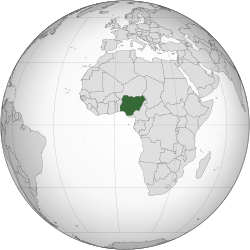Federation of Nigeria
| Federation of Nigeria | ||||||||||
| Commonwealth realm | ||||||||||
|
||||||||||
|
||||||||||
|
Motto "Unity and Faith" |
||||||||||
|
Anthem Nigeria, We Hail Thee Royal anthem God Save the Queen |
||||||||||
| Capital | Lagos | |||||||||
| Languages |
English Hausa · Igbo · Yoruba |
|||||||||
| Government | Constitutional monarchy | |||||||||
| Queen | ||||||||||
| • | 1960–1963 | Elizabeth II | ||||||||
| Governor-General | ||||||||||
| • | 1960 | Sir James Wilson Robertson | ||||||||
| • | 1960–1963 | Nnamdi Azikiwe | ||||||||
| Prime Minister | ||||||||||
| • | 1960–1963 | Abubakar Tafawa Balewa | ||||||||
| Legislature | Parliament | |||||||||
| • | Upper house | Senate | ||||||||
| • | Lower house | House of Representatives | ||||||||
| Historical era | Cold War | |||||||||
| • | Independence | 1 October 1960 | ||||||||
| • | Republic | 1 October 1963 | ||||||||
| Currency | Nigerian pound | |||||||||
|
||||||||||
The Federation of Nigeria was a predecessor to modern-day Nigeria. It existed between 1 October 1960 and 1 October 1963.
When British rule ended in 1960, Nigeria Independence Act 1960 transformed the Federation of Nigeria into an independent sovereign Commonwealth realm. Nigeria shared the Sovereign (British monarch Elizabeth II) with the other Commonwealth realms. The monarch's constitutional roles were mostly delegated to the Governor-General of Nigeria. The royal succession was governed by the English Act of Settlement of 1701. Two people held the office of governor-general:
Abubakar Tafawa Balewa held office as prime minister (and head of government).
The Federal Republic of Nigeria came into existence on 1 October 1963. The monarchy was abolished and Nigeria became a republic within the Commonwealth. Following the abolition of the monarchy, former Governor-General Nnamdi Azikiwe became President of Nigeria.
Elizabeth II did not visit the Federation of Nigeria between 1960 and 1963. She did visit:
...
Wikipedia



